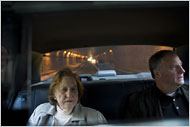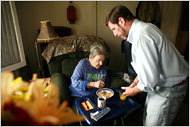|
More Men Take the Lead Role in Caring for Elderly Parents
The New York Times
November 28, 2008

Matt Kassin, 51, helps his mother, Doris Golden, 82, daily.

Peter Nicholson quit a job and moved in to care for his mother, Bernice, who had a series of strokes last winter. He has lost 45 pounds and developed anemia.
When Peter Nicholson’s mother suffered a series of strokes last winter, he did something women have done for generations: he quit his job and moved into her West Hollywood home to care for her full time.
Since then, he has lost 45 pounds and developed anemia, in part because of the stress, and he is running out of money. But the hardest adjustment, Mr. Nicholson said, has been the emotional toll.
“The single toughest moment was when she said to me, ‘And now who are you?’ ” he said. “My whole world just dropped. That was the pinnacle of despair.”
Mr. Nicholson, 53, is part of a growing number of men who are providing primary care for their aging parents, usually their mothers.
The Alzheimer’s Association and the National Alliance for Caregiving estimate that men make up nearly 40 percent of family care providers now, up from 19 percent in a 1996 study by the Alzheimer’s Association. About 17 million men are caring for an adult.
“It used to be that when men said, ‘I’ll always take care of my mother,’ it meant, ‘My wife will always take care of my mother,’ ” said Carol Levine, director of the families and health care project at the United Hospital Fund. “But now, more and more men are doing it.”
Often they are overshadowed by their female counterparts and faced with employers, friends, support organizations and sometimes even parents who view caregiving as an essentially female role. Male caregivers are more likely to say they feel unprepared for the role and become socially isolated, and less likely to ask for help.
Women still provide the bulk of family care, especially intimate tasks like bathing and dressing. At support groups, which are predominantly made up of women, many women complain that their brothers are treated like heroes just for showing up.
But with smaller families and more women working full-time, many men have no choice but to take on roles that would have been alien to their fathers. Just as fatherhood became more hands-on in the baby boom generation, so has the role for many sons as their generation’s parents age.
Mr. Nicholson said his family had not discussed who would take care of his mother, Bernice, if she became frail. But as the unmarried child among his two siblings, and the one who was most readily available, he had spent increasing time with her as she aged.
Still, he was not prepared for the isolation of full-time care. “There’s absolutely no involvement in the outside world,” Mr. Nicholson said. “When I finally get out to a Dodgers game, walking to the car, I say, Oh, this is what life is about. I forgot about this. I can’t be doing myself any good by not getting out of here.”
Isolation affects women as well, but men tend to have fewer lifelines, said Donna Benton, an assistant research professor of gerontology at the University of Southern California and director of the Los Angeles Caregiver Resource Network. Men are less likely to have friends going through similar experiences, and depend more on their jobs for daily human contact.
“That’s the harder part for men, to find someone to talk to,” Dr. Benton said. “It’s the emotional side: the guilt, the sadness, the anger. For men it becomes more stressful because they can’t talk about it. They feel cut off.”
More Information on US Elder Rights Issues
Copyright © Global Action on Aging
Terms of Use |
Privacy Policy | Contact
Us
|



